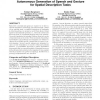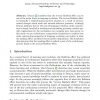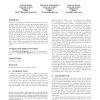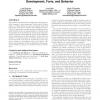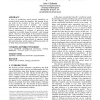1046 search results - page 49 / 210 » Evolution of Embodied Intelligence |
125
Voted
ATAL
2009
Springer
15 years 9 months ago
2009
Springer
Embodied conversational agents are required to be able to express themselves convincingly and autonomously. Based on an empirial study on spatial descriptions of landmarks in dire...
131
click to vote
ECAL
2007
Springer
15 years 6 months ago
2007
Springer
Deacon [1] considers that the reverse Baldwin effect can be one of the major forces in language evolution. The reverse Baldwin effect is essentially a redistributional process of g...
102
click to vote
GECCO
2009
Springer
15 years 9 months ago
2009
Springer
Evolution of multi-agent teams has been shown to be an effective method of solving complex problems involving the exploration of an unknown problem space. These autonomous and het...
90
Voted
GECCO
2007
Springer
15 years 8 months ago
2007
Springer
We present a new framework for artificial life involving physically simulated, three-dimensional blocks called Division Blocks. Division Blocks can grow and shrink, divide and fo...
104
click to vote
GECCO
2007
Springer
15 years 8 months ago
2007
Springer
A series of evolutionary neural network simulations are presented which explore the hypothesis that learning factors can result in the evolution of long periods of parental protec...
